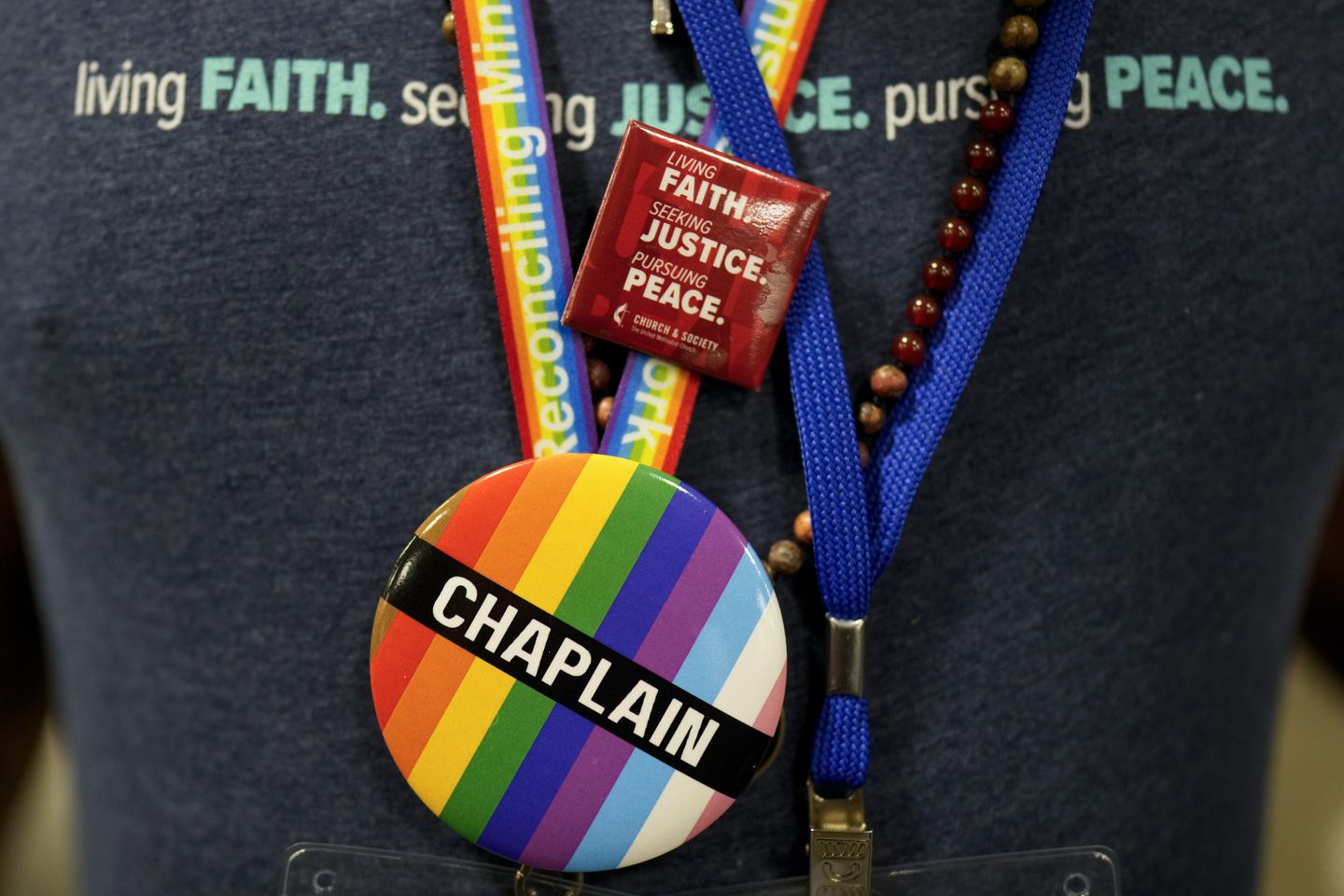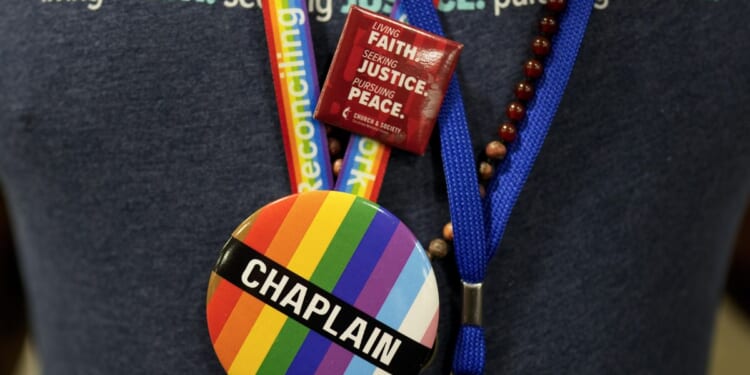
OPINION:
In late 2023, the United Methodist Church (UMC) released many of its conservative churches due to theological disagreements over LGBTQ+ ministers and congregants. Without its more conservative membership weighing in on theological issues, the UMC recently voted to ordain “self-avowed practicing homosexuals” and to allow same-sex unions with little internal resistance.
But how did the UMC get to this point?
As an outsider (I am not a member of the UMC or the newly formed Global Methodist Church), the internal politics that brought about these changes can only be inferred. However, the timeline of events suggests that UMC leadership and/or congregations were allowing practices that were against historic denominational teachings.
Subscribe to have The Washington Times’ Higher Ground delivered to your inbox every Sunday.
For instance, despite the ban on homosexual clergy found in the UMC Book of Discipline, in 2016 the UMC elected the first openly gay bishop with a second elected in 2022. In 2019, a special session of the General Conference of the UMC approved the “traditional plan,” major portions of which were upheld as constitutional by the Judicial Council in April 2019. Yet, despite the 2019 decision, some with the UMC refused to abide by the rules of the denomination.
By June of 2019, 76% of U.S. annual conferences (conferences for regional decision-making) had rejected the traditional plan. While there was still some speculation that the international voting block could uphold the traditional plan at the next General Conference; however, COVID-19 delays ultimately accelerated disaffiliation plans for U. S. congregations only (international churches were not given a disaffiliation option). The departure of conservative churches in the U.S. and logistical challenges in getting African delegates to the 2024 General Convention made the decisions in favor of LGBTQ+ and same-sex marriage inevitable.
SEE ALSO: United Methodists approve gay clergy ordination, ending 40-year-old ban
Why is any of this a problem?
First, the changes made at the 2024 General Conference regarding sexuality and same-sex marriage do not represent the teaching of scripture. The Bible curtails a host of behaviors calling us to imitate Christ. We do not become disciples on our own terms, but on God’s terms. As we learn to live under the authority of Christ, we will find that we must redirect and set aside many of our desires. The UMC decision allows people to love others in the way they deem appropriate rather than shaping people so that they love others on God’s terms. There is clearly a theological problem with the new UMC. Given the recent history of the UMC, however, these changes, as lamentable as they may be, aren’t particularly surprising.
Second, the willingness of certain individuals and groups to ignore the agreed-upon rules of the UMC reflects a disrespect incommensurate with the gospel. I can appreciate the hurt that comes with exclusion and the difficulties associated with conforming to rules with which one does not agree. At various points during my academic career, I was asked to wear long sleeves so my tattoos wouldn’t show. I’ve lost jobs because I wasn’t a part of the right denominations. I even had a dean tell me that I didn’t have a real shot at a faculty position I’d applied for because I was “the wrong color.” Being excluded or asked to conform to standards with which one disagrees isn’t a comfortable position, yet, as members of a given community, particularly a community that claims to sit under the authority of Christ, it is often necessary for us to set aside our comfort and our rights for the sake of the gospel. In the case of the UMC, that simply did not happen.
In considering the recent history of the UMC and the willingness of some members to openly disregard the Book of Discipline which outlined the “laws, plan, polity, and process by which the United Methodists govern themselves”, it is hard not to think of 1 Timothy 6:1. On that text, Paul instructs bondservants to “regard their own masters as worthy of all honor.”
Perhaps some of the masters were indeed honorable; however, the purpose of showing masters honor was to ensure that God and the church‘s teachings were not reviled. The open rebellion against the community rules in the UMC reflects a desire to pursue specific notions of justice rather than ensuring God and the church‘s teachings are not reviled.
Finally, denominational accountability was, evidently, insufficient. Disciplinary action seems to have been uneven at best with the UMC membership refusing to adhere to the 2019 decisions regardless of how other congregations (e.g., those in Africa and conservative congregations) might be impacted by their continued disobedience rather than ongoing dialogue. In essence, those whose practice aligned with the Book of Discipline and the historic teaching of the UMC ended up being required to buy their way out of the UMC if they didn’t want to continue to be part of a denomination with those who refused to adhere to the rules. Those who followed the community’s rules were disadvantaged by those who didn’t.
The UMC’s decisions in 2024 are lamentable. The events that paved the way for those decisions suggest that many in the UMC have become enamored with their own agendas. Considering all the UMC has gone through in the past several years should give all of us pause.
We need to reflect on our commitment to remain accountable to a local congregation and/or denominational body. We need to consider how to pursue change and be patient despite the hurts we may feel. We need to ensure that we have a disciplinary structure that will push against those who seek change not through communal conversation and discernment but by disregarding the agreed upon rules of the game and stirring up discord and division.
While some of the UMC’s issues are particular to the UMC, their underlying dynamics may not be. We should not be so arrogant to assume that similar challenges may not arise in our churches and denominations. Instead, we should be diligent to ensure that our congregations and denominations are committed to dialogue and discipline.
–
James Spencer earned his Ph.D. in Theological Studies from Trinity Evangelical Divinity School. He believes discipleship will open up opportunities beyond anything God’s people could accomplish through their own wit and wisdom. As such, his writing aims at helping believers look with eyes that see and listen with ears that hear as they consider, question, and revise the social, cultural, and political assumptions hindering Christians from conforming more closely to the image of Christ. James has published multiple works, including his most recent book “Serpents and Doves: Christians, Politics, and the Art of Bearing Witness,” “Christian Resistance: Learning to Defy the World and Follow Christ,” “Useful to God: Eight Lessons from the Life of D. L. Moody,” “Thinking Christian: Essays on Testimony,” “Accountability, and the Christian Mind,’ and“Trajectories: A Gospel-Centered Introduction to Old Testament Theology.” In addition to serving as the president of the D. L. Moody Center, James is the host of “Useful to God” a weekly radio broadcast and podcast, a member of the faculty at Right On Mission, and an adjunct instructor with the Wheaton College Graduate School. 0

